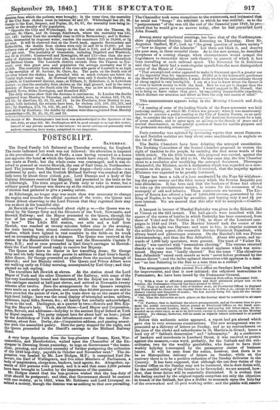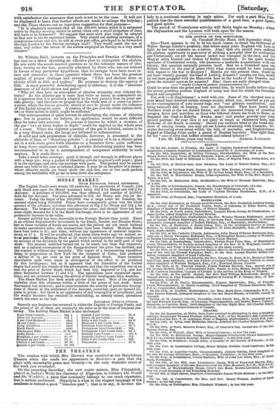The arrangements at the central Post-office on Sundays have long
called for improvement, and that is now initiated: the subjoined instructions to Postmasters, &c. have been issued by the Postmaster-General.
"General Post-office, September 1849.
"I. With a view to affording postmasters and their assistants proper rest on the Sunday, the Postmaster-General has been pleased to direct-
" 1st. That on and after the 14th of October next, all Provincial Offices in England and Wales shall be closed on the Sunday from ten a.m. to five p.m., except for the ne- cessary receipt and despatch of malls; the box merely being left open for the receipt of stamped and unpaid letters. "2d. That the deliveries at such places on the Sunday shall be restricted to all cases to one.
"II. Further, that to facilitate the above arrangements, and at the same time to pro- mote the public convenience, letters posted at Provincial Offices on the blank post- day for towns beyond London, shall, if stamped and paying full letter-rates, be for- warded as on other days, so as to be delivered, except In remote places, on the Monday morning. No change, however, will be made as regards letters addressed to or posted in London."
Before this authentic notice appeared, a report had got abroad which gave rise to very erroneous constructions. The new arrangement was re- presented as a delivery of letters on Sunday, and as an encroachment on the time of the clerks and subordinates in St. Martin's-le-Grand; hence a loud cry of " Sabbath desecration" and " inhumanity." At a conference of bankers and merchants in Lombard Street, it was resolved to protest against the measure,—one word, probably, for the Sabbath and the sub- ordinates, two for the wealthy gentlefolks, who feared to have their weekly holyday interrupted by the peremptory claims of business letters. It will be seen from the notice, however, that there is to be no Metropolitan delivery of letters on Sunday, while on the contrary there is to be a positive reduction of the Sunday deliveries in the Country. It has been supposed, that although the out-door duties of the Central Office on the Sunday may not be increased, the in-door duties will, by the needful sorting of the letters to be forwarded: we are assured, how- ever, that those duties will be materially diminished. It is evident that the feeling excited by the original reports comprises not only the objection to breach of the Sabbath, but also a dislike to encroach' upon the holyday of the overworked and ill-paid working order; and the publie will receive with satisfaction the assurance that such is not to be the case. It will not be displeased te learn that further efforts are made to enlarge the holyday; and the Times throwe out an ingenious suggestion for that purpose-- "Is it absolutely necessary that all the 200,000 letters which it is estimated arrive by Sunday morning should be sorted, when only a small proportion of them will have to be forwarded ? We suggest that some such plan might be adopted as that now in use for registered letters. Why should net shilling envelopes, of a conspicuous colour and size, be sold at every post-office, privileged to be forwarded through London by the Sunday evening's mail? They world catch the eye at once, and reduce the labour of the sorters employed on Sunday to a very small compass."



























 Previous page
Previous page